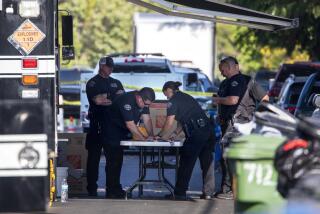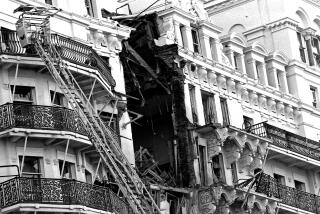Handling Explosives a Tradition in Family of Victim
- Share via
His grandfather was a radical Irishman who fled to the United States after developing a reputation as an “explosives handler” in the Irish Republican Army. His father, he used to boast, became familiar with dynamite while working as a blaster in the coal mines of Kentucky.
Detective Arleigh McCree of the Los Angeles Police Department used to joke that it was his destiny to defuse bombs. Thus, when he was killed doing just that Saturday, there was something bitterly poetic in it, for it was not just his job.
It was in his blood.
When the U.S. Marine barracks in Beirut was destroyed in October, 1983, by a suicide bomber, McCree was asked by the U.S. government to help investigate, and so he went to Lebanon. When officials worried over the possibility of terrorists disrupting the 1984 Olympics in Los Angeles, it was McCree who helped coordinate police tactics and visited terrorist hot spots abroad to gain insights.
But those who knew Arleigh McCree best say there was more to him than the ultra-serious head of the Police Department’s bomb squad and resident expert on international terrorism.
An avid scuba diver, he sometimes called himself “Jacques Arleigh” after the famous French undersea explorer, Jacques Cousteau. To his subordinates on the fourth floor at police headquarters, he was often “Uncle Arleigh,” the senior detective who urged them to visit when they were having problems.
The sign above his desk said “Referee,” and when there were sibling-like spats within the 11-member bomb squad, as there sometimes are among men bonded by danger, it was he who settled them.
‘Had So Many Friends’
“That man had so many friends,” said Frank S. Njavro, a retired deputy coroner who was McCree’s friend for 20 years and his landlord in Alhambra for 12. “If they have an open funeral, a million people will be there.”
The second of six children, McCree was born on Christmas Eve, 1939, in Bush, Ill., but grew up in Kentucky, according to his stepbrother, Willis McCree of Brigham City, Utah. His parents later divorced.
As a boy, McCree took advantage of his father’s extensive firearms collection and once testified in court that he became adept at guns of every size, from pistols to buffalo rifles.
He said he learned about explosives from his father at the age of 12 and furthered his knowledge while handling underwater demolition assignments as a U.S. Navy diver.
Formal, almost taciturn, the 6-foot, brown-haired McCree joined the Police Department in 1965 and was assigned to the firearms and explosives unit in 1979. He was a graduate of the Red Stone Arsenal Hazardous Device Course, a civilian bomb school in Huntsville, Ala., and was a founding member of the International Assn. of Bomb Technicians and Investigators.
He came to be regarded as a storehouse of knowledge on international terrorism. He often was asked to write articles for law enforcement journals or speak at police seminars on that subject.
McCree moved to Sylmar in late 1984 after he married his third wife, Edith, a flight attendant with United Airlines, Njavro said.
He had two children, a boy and girl, who live in the San Diego area.
As the bomb squad’s senior detective, McCree had the option on Saturday of going to North Hollywood, where officers had discovered two pipe bombs, or staying home.
He chose to go voluntarily.
“He was an extremely dedicated policeman,” a grieving Njavro said.
More to Read
Sign up for Essential California
The most important California stories and recommendations in your inbox every morning.
You may occasionally receive promotional content from the Los Angeles Times.










